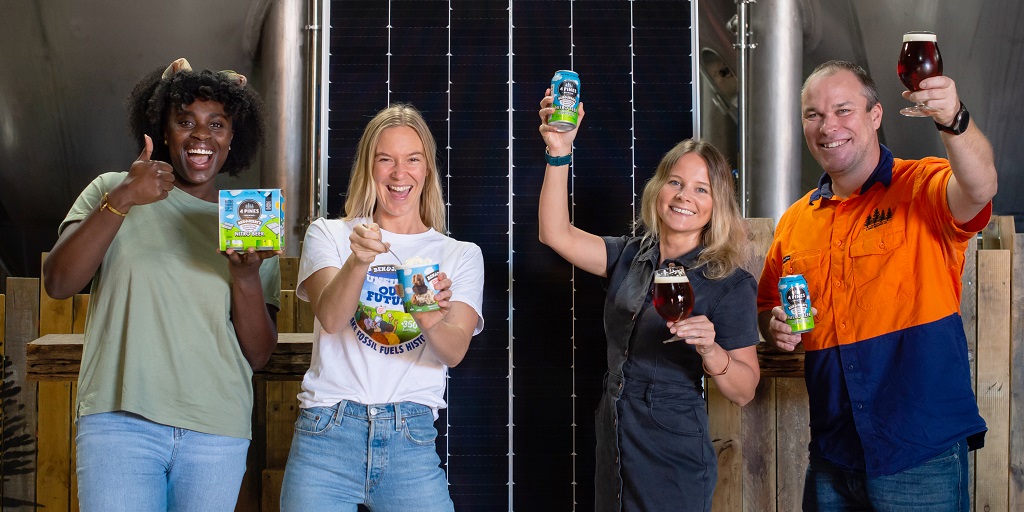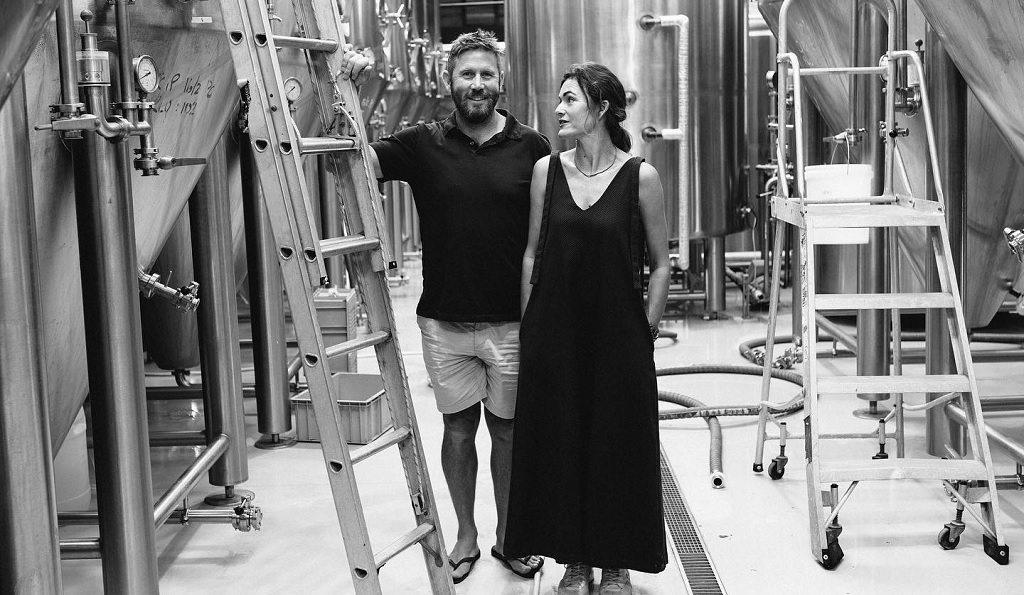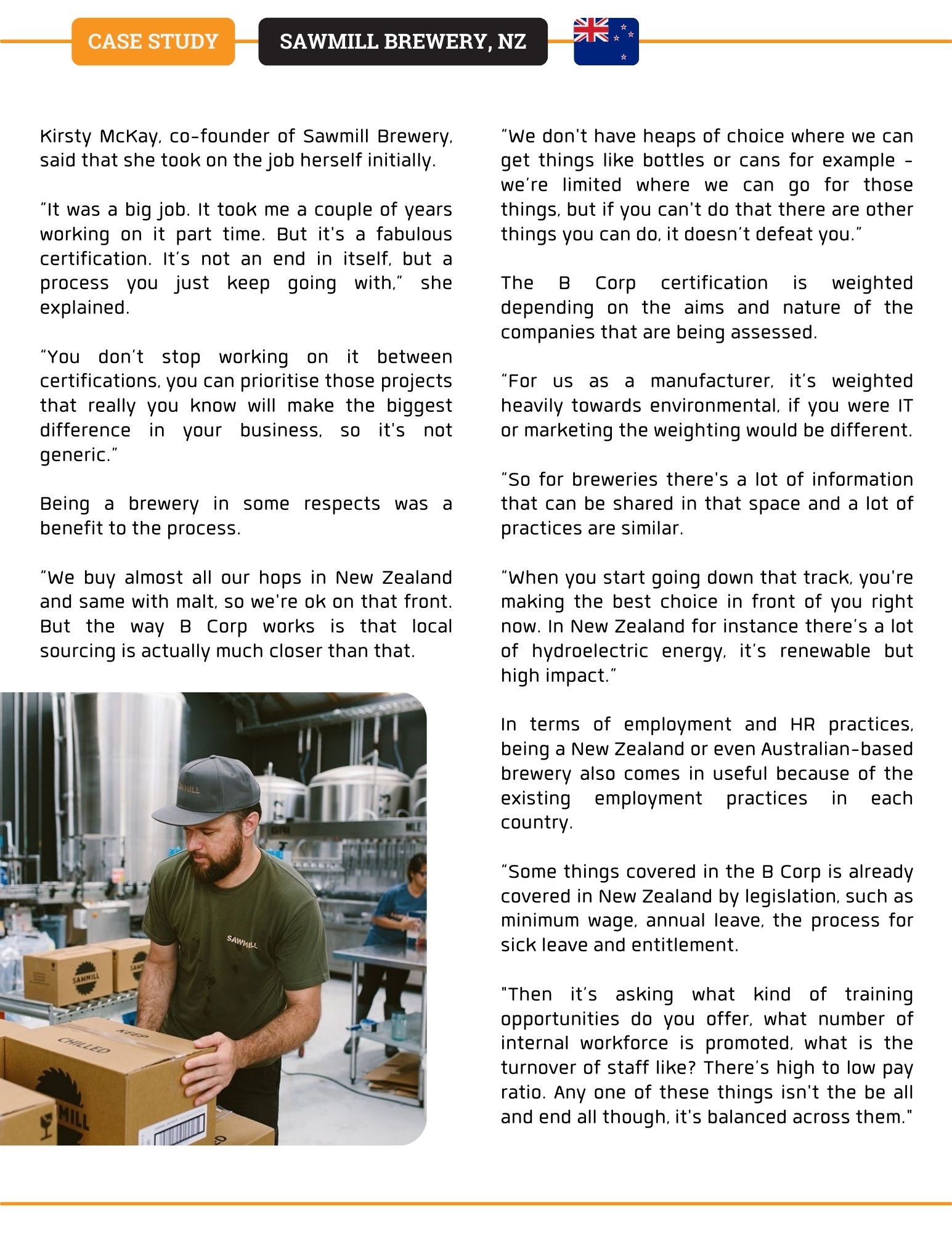Becoming a B Corp brewery April 2022

4 Pines brewed a beer in collaboration with ice cream makers Ben & Jerry’s last year to support Australia’s first community-owned power company, Enova Community Energy.
Improving social and environmental impacts is no longer optional for businesses. Cost benefit analysis across industries has shown that investment in these areas can help a business in all manner of ways, from attracting and retaining staff to cutting operational costs, improving customer engagement and market reputation and so on – although other benefits are more intangible.
One way for brewers to look at their business holistically and strive to improve in social, environmental and economic ways is by achieving B Corp Certification.
Unlike other carbon neutral certifications, B Corp is conferred by a single organisation, B Lab, a non-profit organisation that operates globally.
Certification requires a score of 80 or above out of 200, against five areas of impact: Governance, Community, Workers, Environment and Customers.
Small and medium businesses fall into its standard approach to certification – defined as companies with under US$100 million ($131 million AUD). But “complex businesses” – those which operate in two or more industries or five or more companies or have 10 or more subsidiaries – are certified differently.
A number of beverage manufacturers have managed to achieve this certification, including Stone & Wood Brewing which achieved it in 2016, 4 Pines Brewing Co. and Sawmill Brewery in New Zealand. Cape Byron Distillery was also recently certified, one of only two distilleries in Australia to have achieved the certification.
Attaining B Corp certification is described as a rigorous process, one that small and medium businesses that are often time-poor may be reluctant to commence. In fact, in the brewing industry globally, only around 32 brewing businesses are certified.
Ttobie Arowobusoye is sustainability and social impact advisor at 4 Pines – which became B Corp certified in 2017 and has remained so, even after its acquisition by Carlton & United Breweries owner AB InBev in the same year.
“It was just 4 Pines by itself [when it became certified] so they could control policies and supply chain, and then things started to get trickier in terms of governance when it was acquired,” she explained.
“Because it’s not just about the environment, it has aspects of sustainability and environment, but also customers and governance, so it’s all part of how you can do things better.
“The tricky bit for 4 Pines now is governance. How do we do business around the management side of things? What does ownership look like or turnover or supply chain management? That is really tricky when you’re owned by someone else. But we’re also looking at things like our own environment and we obviously brew our own beer so we have a good grasp of that – that’s more straightforward.”
All B Corp certified companies must be recertified every three years.
“It was a lot of work, and it was my first time doing it [in 2019] and I’d just joined,” she explained.
“B Corp is an American company but they’re in Australia and they have an Australian team but obviously with COVID they can’t come on-site, but we had Zoom call where they talk to a few key people and ask us about our supplier diversity, supply chain, due diligence, our packaging and procurement, they talk to our supply team and see what that looks like.
“They also look at where our ingredients are coming from, how far they are from the manufacturing plant, and ask about the parent companies, learn about policies, the procurement of items and people getting paid fairly.”
Certifying and recertifying is a complex process covering many different aspects of a business, not just its environmental impact. Another brewery that has completed it is Sawmill Brewery, New Zealand’s only B Corp certified brewery and the only one in either country that is both independent and B Corp certified.


Why get B Corp certified?
With revenue-dependent annual fees of between $1,000 and $50,000 to become a Certified B Corporation and the huge time commitment required, it’s understandable that more breweries have not undertaken B Corp certification, but 4 Pines’ Arowobusoye predicted this might be set to change.
“I get a lot of emails from breweries asking how to become B Corps, so there may be a glut of B Corps in the next few years. A big part of it is the size of breweries now, they might have been a bit small and now they’re at a size where they could start thinking about it,” she said.
But the reasons behind going for B Corp certification are varied.
“For me, as a cautious consumer, I personally look for [B Corp certified companies] because I know there has been thought behind how the business operates – it’s been done on my behalf.
“There are a lot of different certifications, but nothing that is this holistic – it gives me that confidence that the company I’m purchasing from operates in a way that aligns with my personal values,” Arowobusoye explained.
Sawmill’s McKay said she similarly had fielded a lot of calls about becoming a B Corp.
“I speak to a lot of people about B Corp, and actually every business would find the [Impact Assessment] questionnaire helpful. It’s too much work people say, they don’t have money to swap to solar, but you’ll cover a lot of things you can do as a business, if you were to start to move towards it, that’s a good outcome – every business would benefit from heading in that direction.”
While some companies have been accused of ‘greenwashing’ and while many awards and accreditations can be used to relay a brand’s values to customers, its tricky to justify this label in relation to B Corp due to its onerous process.
“We did it for ourselves internally, and we don’t do a lot of marketing around it or anything, and it’s not terribly well known in New Zealand, but it’s becoming more well known. They had double the number of certified businesses in the past year, and more high-profile businesses, so people are coming to understand the certification a little more, and realise that it doesn’t just apply to just one aspect of the business.
“It’s so tricky to be a consumer and know how to make sense of what businesses are telling you, but when you can explain it to people with B Corp, that makes it easier to tell them what your values are.”
The business benefits of streamlining processes are also clear, McKay explained.
“What I also say to people is that it makes really good business sense, it’s not just a feel-good certification, so much especially for manufacturing is about efficiency and good systems that minimise waste.
“There’s a really strong focus on minimising waste in the broad sense, not just rubbish, but wasting of any resources; power, water, time, and retaining your team, developing a strong culture and great working conditions that lead to a more efficient, better-run business.”
Carbon neutral certifications, for instance, improve sustainability credentials, but only look at the environmental impact of a business, rather than social impacts, she explained.
“You can be certified carbon neutral or organic but they don’t look at the full picture of how you operate as a business. It can be a bit one dimensional, particularly with carbon. What we really liked was that it covers the full picture.
“It’s great for any size business and in some respects, it can be easier if you’re smaller or starting out – it’s definitely not a certification that’s just set up for corporations.
“When you’re smaller everything’s scaled down. It took me a long time but it’s worth it. We want to be a business that has a positive impact on our team and environment, and it also helps the efficient and effective operation of your business, as well as your bottom line.”


